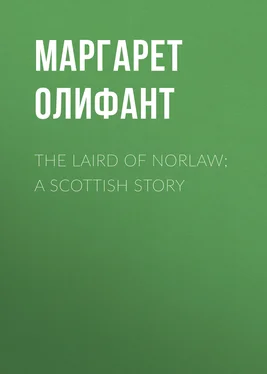Маргарет Олифант - The Laird of Norlaw; A Scottish Story
Здесь есть возможность читать онлайн «Маргарет Олифант - The Laird of Norlaw; A Scottish Story» — ознакомительный отрывок электронной книги совершенно бесплатно, а после прочтения отрывка купить полную версию. В некоторых случаях можно слушать аудио, скачать через торрент в формате fb2 и присутствует краткое содержание. Жанр: foreign_prose, literature_19, foreign_antique, на английском языке. Описание произведения, (предисловие) а так же отзывы посетителей доступны на портале библиотеки ЛибКат.
- Название:The Laird of Norlaw; A Scottish Story
- Автор:
- Жанр:
- Год:неизвестен
- ISBN:нет данных
- Рейтинг книги:3 / 5. Голосов: 1
-
Избранное:Добавить в избранное
- Отзывы:
-
Ваша оценка:
- 60
- 1
- 2
- 3
- 4
- 5
The Laird of Norlaw; A Scottish Story: краткое содержание, описание и аннотация
Предлагаем к чтению аннотацию, описание, краткое содержание или предисловие (зависит от того, что написал сам автор книги «The Laird of Norlaw; A Scottish Story»). Если вы не нашли необходимую информацию о книге — напишите в комментариях, мы постараемся отыскать её.
The Laird of Norlaw; A Scottish Story — читать онлайн ознакомительный отрывок
Ниже представлен текст книги, разбитый по страницам. Система сохранения места последней прочитанной страницы, позволяет с удобством читать онлайн бесплатно книгу «The Laird of Norlaw; A Scottish Story», без необходимости каждый раз заново искать на чём Вы остановились. Поставьте закладку, и сможете в любой момент перейти на страницу, на которой закончили чтение.
Интервал:
Закладка:
“Do you think so?” said Huntley, looking eagerly into Katie’s face.
“Yes, unless I could be your real sister for a while, as long as Mrs. Livingstone needed me,” said Katie, with a smile, “and I almost wish I could—I am so good at it—to take care of you boys.”
“There is no fear of us now,” said Huntley. “The worst’s over, as the minister says. We’ve had no time to think what we’re to do, Dr. Logan; but I’ll come and tell you whenever we can see what’s before us.”
“I’ll be very glad, Huntley; but I’ll tell you what’s better than telling me,” said Dr. Logan. “Katie has a cousin, a very clever writer in Edinburgh—I knew there was something I wanted to tell you, and I had very near forgotten—if you’ll take my advice, you’ll go in, it’s not very far, and get him to manage the whole thing for you. Here’s the address that Katie wrote down last night. Tell your mother about it, Huntley, and that it’s my advice you should have a sound man in the law to look after your concerns; and come down to the manse as soon as you can, if it were only for a change; and you’ll give your mother our regards, and we’ll bid you good-day.”
“And dinna think more than you should, or grieve more, Huntley—and come and see us,” said Katie, offering him her hand again.
Huntley took it, half joyfully, half inclined to burst out into boyish tears once more. He thought it would have been a comfort and refreshment to have had her here, this wearied, melancholy day. But somehow, he did not think with equal satisfaction of Katie’s cousin. It seemed to Huntley he would almost rather employ any “writer” than this one, to smooth out the raveled concerns of Norlaw.
CHAPTER X
Common daylight, common life, the dead buried out of their sight, the windows open, the servants coming to ask common questions about the cattle and the land. Nothing changed, except that the father was no longer visible among them—that Huntley sat at the foot of the table, and the Mistress grew familiar with her widow’s cap. Oh, cruel life! This was how it swallowed up all the solemnities of their grief.
And now it was the evening, and the eager youths could be restrained no longer. Common custom had aroused even the Mistress out of her inaction, sitting by the corner window, she had once more begun mechanically to notice what went and came at the kitchen door—had been very angry with the packman, who had seduced Jenny to admit him—and with Jenny for so far forgetting the decorum due to “an afflicted house;” had even once noticed, and been partially displeased by the black ribbons in Marget’s cap, which it was extravagant to wear in the morning; and with melancholy self-reproof had opened the work basket, which had been left to gather dust for weeks past.
“I needna be idle now "—the Mistress said to herself, with a heavy sigh; and Huntley and Patie perceived that it was no longer too early to enter upon their own plans and views.
With this purpose, they came to her about sunset, when she had settled herself after her old fashion to her evening’s work. She saw instinctively what was coming, and, with natural feeling, shrunk for the moment. She was a little impatient, too, her grief taking that form.
“Keep a distance, keep a distance, bairns!” cried the Mistress; “let me have room to breathe in! and I’m sure if ye were but lassies, and could have something in your hands to do, it would be a comfort to me. There’s Jenny, the light-headed thing, taken her stocking to the door, as if nothing was amiss in the house. Pity me!—but I’ll not be fashed with her long, that’s a comfort to think of. Laddies, laddies, can ye no keep still? What are ye a’wanting with me?”
“Mother, it’s time to think what we’re to do; neither Patie nor me can keep quiet, when we think of what’s before us,” said Huntley—“and there’s little comfort in settling on any thing till we can speak of it to you.”
The Mistress gave way at these words to a sudden little outbreak of tears, which you might almost have supposed were tears of anger, and which she wiped off hurriedly with an agitated hand. Then she proceeded very rapidly with the work she had taken up, which was a dark gray woolen stocking—a familiar work, which she could get on with almost without looking at it. She did look at her knitting, however, intently, bending her head over it, not venturing to look up at her children; and thus it was that they found themselves permitted to proceed.
“Mother,” said Huntley, with a deep blush—“I’m a man, but I’ve learned nothing to make my bread by. Because I’m the eldest, and should be of most use, I’m the greatest burden. I understand about the land and the cattle, and after a while I might manage a farm, but that’s slow work and weary—and the first that should be done is to get rid of me.”
“Hold your peace!” cried the Mistress, with a break in her voice; “how dare ye say the like of that to your mother? Are you not my eldest son, the stay of the house? Wherefore do ye say this to me?”
“Because it’s true, mother,” said Huntley, firmly; “and though it’s true I’m not discouraged. The worst is, I see nothing I can do near you, as I might have done if I had been younger, and had time to spare to learn a trade. Such as it is, I’m very well content with my trade, too; but what could I do with it here? Get a place as a grieve, maybe, through Tyneside’s help, and the minister’s, and be able to stock a small farm by the time I was forty years old. But that would please neither you nor me. Mother, you must send me away!”
The Mistress did not look up, did not move—went on steadily with her rapid knitting—but she said:—
“Where?” with a sharp accent, like a cry.
“I’ve been thinking of that,” said Huntley, slowly; “If I went to America, or Canada, or any such place, I would be like to stay. My mind’s against staying; I want to come back—to keep home in my eye. So I say Australia, mother.”
“America, Canada, Australia!—the laddie’s wild!” cried the Mistress. “Do you mean to say ye’ll be an emigrant? a bairn of mine?”
Emigration was not then what it is now; it was the last resort—sadly resisted, sadly yielded to—of the “broken man;” and Huntley’s mother saw her son, in imagination, in a dreary den of a cabin, in a poor little trading ship, with a bundle on the end of a stick, and despair in his heart, when he spoke of going away.
“There’s more kinds of emigrants than one kind, mother,” said Patie.
“Ay,” said the Mistress, her imagination shifting, in spite of her, to a dismal family scene, in which the poor wife had the baby tied on her back in a shawl, and the children at her feet were crying with cold and hunger, and the husband at her side looking desperate. “I’ve seen folk on the road to America—ay, laddies, mony a time. I’m older than you are. I ken what like they look; but pity me, did I ever think the like of that would be evened to a bairn of mine!”
“Mother,” said Huntley, with a cheerfulness which he did not quite feel, “an emigrant goes away to stay—I should not do that—I am going, if I can, to make a fortune, and come home—and it’s not America; there are towns there already like our own, and a man, I suppose, has only a greater chance of getting bread enough to eat. I could get bread enough in our own country-side; but I mean to get more if I can—I mean to get a sheep farm and grow rich, as everybody does out there.”
“Poor laddie! Do they sell sheep and lands out there to them that have no siller?” said the Mistress. “If you canna stock a farm at hame, where you’re kent and your name respected, Huntley Livingstone, how will you do it there?”
Читать дальшеИнтервал:
Закладка:
Похожие книги на «The Laird of Norlaw; A Scottish Story»
Представляем Вашему вниманию похожие книги на «The Laird of Norlaw; A Scottish Story» списком для выбора. Мы отобрали схожую по названию и смыслу литературу в надежде предоставить читателям больше вариантов отыскать новые, интересные, ещё непрочитанные произведения.
Обсуждение, отзывы о книге «The Laird of Norlaw; A Scottish Story» и просто собственные мнения читателей. Оставьте ваши комментарии, напишите, что Вы думаете о произведении, его смысле или главных героях. Укажите что конкретно понравилось, а что нет, и почему Вы так считаете.












